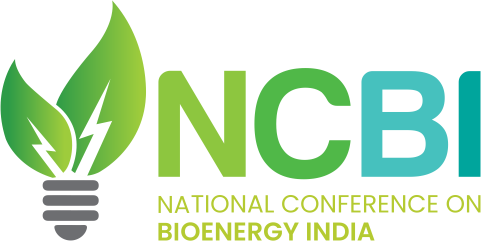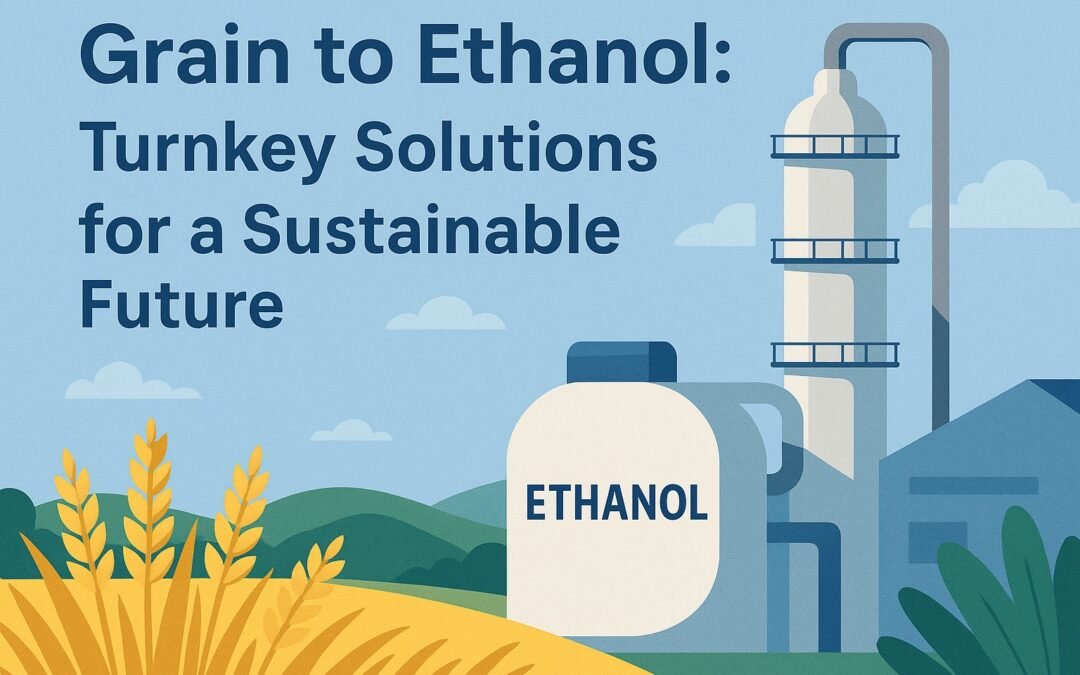Introduction
As the world shifts toward cleaner energy and energy independence, grain-based ethanol is becoming a vital player in the global renewable energy scene. Unlike fossil fuels, ethanol made from grains not only helps meet energy demands but also supports the environment, the economy, and the agricultural sector. Driving this transformation are EPC (Engineering, Procurement, and Construction) companies offering turnkey solutions that manage everything from design to commissioning.
These fully integrated services are fast-tracking the development of ethanol plants across India and internationally. At major industry events like the Bioenergy Global Exhibition 2025, the Renewable energy exhibition in India, and the India green energy expo, discussions revolved around ethanol and other scalable green fuel technologies.
In this article, we’ll take a closer look at the grain-to-ethanol process, the importance of turnkey solutions, and why India is becoming a global leader in the bioenergy space.
1. Understanding Grain-to-Ethanol Conversion
Grain-to-ethanol conversion is the process of turning starchy grains—like maize, wheat, sorghum, or barley—into ethanol using fermentation. This ethanol can be blended with petrol or used on its own as a cleaner alternative to conventional fuels, helping reduce emissions and reliance on crude oil.
How the Process Works:
- Grinding: Breaking the grains down into fine particles.
- Liquefaction: Mixing the ground grain with water and enzymes to create a slurry.
- Saccharification: Converting the starch into fermentable sugars.
- Fermentation: Adding yeast to turn sugars into ethanol.
- Distillation: Extracting the ethanol from the mix.
- Dehydration: Removing remaining water to create fuel-grade ethanol.
2. Why Grain-Based Ethanol Is Important for India
India has historically produced ethanol from molasses, a by-product of sugar processing. But this source has limitations—it’s seasonal and not always available in large quantities. Grain-based ethanol offers a more reliable, year-round alternative. With India aiming to achieve 20% ethanol blending (E20) by 2025, incorporating grain-based ethanol into the fuel supply is becoming essential.
India’s active participation in major energy events like the Renewable energy exhibition in India and the India green energy expo reflects its commitment to expanding and diversifying its ethanol sources.
3. The Growing Role of Turnkey EPC Providers
What Are Turnkey Solutions?
Turnkey solutions involve a single EPC company handling every stage of a project:
- Design and engineering
- Procuring equipment
- Constructing the plant
- Starting operations and training staff
- Providing ongoing maintenance and support
Benefits of Choosing Turnkey Services:
- Faster project completion
- One-stop accountability
- Greater operational efficiency
- Compliance with safety and environmental standards
Features of a Modern Turnkey Ethanol Plant:
- Modular and flexible plant design
- Advanced automation and IoT controls
- Zero Liquid Discharge (ZLD) effluent treatment systems
- Hands-on training for plant personnel
During the Bioenergy Global Exhibition 2025, several leading EPC firms presented the latest turnkey ethanol plant innovations, signaling a strong move toward modernization in this sector.
4. Policy Support and the Regulatory Landscape in India
The Indian government is actively encouraging ethanol production through various schemes and incentives:
- The National Bio-Energy Mission
- The Ethanol Blended Petrol (EBP) Programme
- Subsidies, low-interest loans, and viability gap funding
- Excise duty exemptions for ethanol
At the India green energy expo, experts and policymakers highlighted how public-private partnerships can further accelerate the country’s ethanol goals.
5. Expanding Feedstock Options: Beyond Maize
While maize is a common feedstock, India’s ethanol strategy now includes other grains:
- Sorghum (jowar)
- Pearl millet (bajra)
- Broken rice
- Surplus or spoiled wheat from the Food Corporation of India
This variety not only protects food security but also makes use of otherwise underutilized crops.
6. Innovations in Ethanol Production Technology
Today’s turnkey ethanol plants are equipped with state-of-the-art technology:
- Fermentation: New yeast strains offer higher ethanol yields.
- Energy efficiency: Systems recycle steam and generate power from waste.
- Automation: Smart systems like SCADA and IoT improve plant control.
- Waste management: Biogas recovery and eco-friendly effluent treatment.
These advances were on full display at the Renewable energy exhibition in India, drawing strong interest from both investors and environmental groups.
7. Uplifting Rural Economies
Grain-to-ethanol production has far-reaching benefits for rural communities:
- Guaranteed income for farmers through grain purchase agreements
- Job creation in construction, plant operation, and logistics
- By-products like DDGS (Distillers Dried Grains with Solubles) that can be used as animal feed or biofertilizer
States like Bihar, Madhya Pradesh, and Maharashtra are already seeing the socio-economic benefits of ethanol plants.
8. Ethanol’s Environmental Impact
Compared to fossil fuels, ethanol burns cleaner and greener:
- Lower carbon monoxide and particulate emissions
- Reduced reliance on imported crude oil
- Supports India’s climate commitments under the COP26 agreement
At the Bioenergy Global Exhibition 2025, success stories were shared showing how ethanol-blended fuel is helping clean up city air.
9. Top EPC Companies in India’s Ethanol Industry
Some of the key players offering turnkey ethanol solutions in India are:
- Praj Industries
- ISGEC Heavy Engineering
- Shrijee Group
- Excel Engineers & Consultants
- KBK Chem-Engineering
These companies offer ethanol plant designs tailored for capacities ranging from 10 KLPD to 500 KLPD.
10. Real-Life Example: Buxar’s 100 KLPD Ethanol Plant
Location: Buxar, Bihar
Grain Used: Maize and broken rice
Output: 100 KLPD of ethanol and 75 tons of DDGS daily
EPC Partner: Praj Industries
Notable Features:
- Automated control systems
- Zero Liquid Discharge effluent treatment
- Biogas-based steam system
- Commissioned in just over a year
This project was featured at the India green energy expo and is now seen as a model for ethanol production in eastern India.
11. Challenges Ahead
Despite the progress, the industry faces a few hurdles:
- Difficulty acquiring land
- Fluctuating grain prices
- Delays in regulatory approvals
- Shortage of trained staff
Industry forums like the Renewable energy exhibition in India are helping to address these challenges through collaboration and knowledge sharing.
12. Global Partnerships Driving Innovation
India is attracting international partners in the ethanol sector:
- Collaboration with the U.S. on clean energy
- Technical cooperation with Brazil
- Technology sharing from Japan and Germany
Many of these partnerships were formalized at the Bioenergy Global Exhibition 2025, strengthening India’s position in the global energy transition.
13. Smart Ethanol Plants and Digital Innovation
Modern turnkey plants now include:
- Digital dashboards for real-time monitoring
- Predictive maintenance to reduce downtime
- Cloud-based analytics for better decision-making
These features help plant operators maximize output while keeping costs low.
14. Looking Ahead: Flex Fuel and Net-Zero Goals
India’s targets for 2025 and beyond include:
- 20% ethanol blending with petrol
- A growing fleet of flex-fuel vehicles
- Halving transportation emissions
Grain-based ethanol will be a cornerstone of India’s green energy future, and turnkey plants will be essential to meet these ambitious goals.
Conclusion
Turnkey solutions for grain-to-ethanol production are helping India take bold strides toward energy sustainability. With strong policy support, cutting-edge technology, and growing private investment, ethanol is set to play a major role in India’s green energy roadmap.
Events like the Bioenergy Global Exhibition 2025, the Renewable energy exhibition in India, and the India green energy expo are fostering innovation and collaboration in this space.
As India builds toward a cleaner, more sustainable future, turnkey ethanol projects stand at the forefront—blending science, infrastructure, and economic opportunity into one powerful energy solution.




